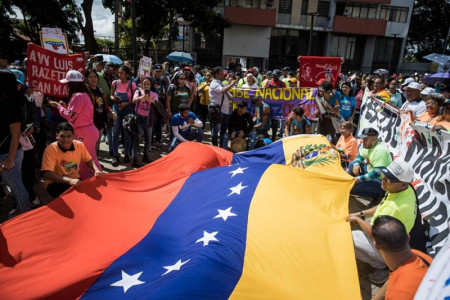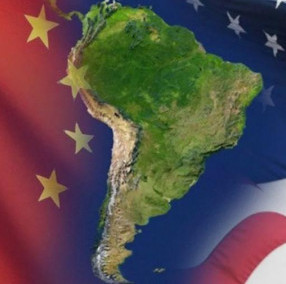
- Press review: US suspends USAID aid to Central Asia while Hamas visits Moscow again
- Press review: US urges elections in Ukraine as Trump enforces tough import tariffs
- Press review: NATO increases defense spending as Russia-Germany trade turnover falls
- Press review: Kiev may lose military aid while Trump
A conflict is brewing in South America with a potential to escalate into open warfare. Historically, the territorial dispute between Venezuela and Guyana (former British Guiana) has been heating up over Caracas' intention to "restore justice" and retain a good part of Guyana's territory. The Guyana-controlled Essequibo River area has been sowing discord for 200 years between Venezuela and Guyana. While Venezuela deems the Essequibo as the two countries’ natural border, Guyana authorities reject this. Official Caracas announced a nationwide "consultative" referendum on the disputed territory’s fate on December 3. The Venezuelan-claimed left bank of Essequibo is a large part of present-day Guyana, coving six of its ten administrative regions.
The territorial dispute between Venezuela and Guyana has hardly ever subsided. In 1819, the Spanish colonies in South America achieved independence from Madrid by uniting into the new state of Colombia (historians conditionally call it Greater Colombia to avert confusion with present-day Colombia). In 1831, it divided into several states that we know as Colombia, Venezuela, Ecuador and Panama. The origins of Venezuela's territorial dispute with neighboring British Guiana, a country now known as Guyana, dates back to the same period. Guiana itself became British in 1814, when Britain purchased the territory from the Netherlands. However, the acquisition contract between London and Amsterdam failed to define Guiana’s western border. Venezuelans believe that their weak young state in the 18030s yielded power over the Essequibo zone, which actually belonged to Venezuela, to Guiana’s then owner.
The disputed area in Guyana’s western part is a soil rich in minerals and natural resources, with its key asset being a vast oil field discovered in 2015. President Nicolas Maduro’s government has been gradually escalating tensions with Guyana since 2015, coincidentally. And now, Venezuela seems determined to break the status quo by convening a national referendum on the disputed region.
The Government of Guyana has already branded it a real threat to the country’s territorial integrity, appealing to the International Court of Justice in The Hague to stop the venue. Venezuela rejected Guyana's escapade on the grounds that it was interference in its internal affairs. In his turn, Venezuela’s Maduro said the Essequibo referendum would take place regardless of the weather or other conditions.
At the referendum, Venezuelans are particularly asked whether they back the creation of the state of Guyana-Essequibo, whose 125 thousand residents will be granted Venezuelan citizenship. While the referendum outcome will not be binding in terms of international law, critics of the Venezuelan leader refer to its "nationalistic connotation" and direct link to the presidential race 2024, in which President Maduro is up for for reelection. Analysts expect massive public support for the government proposals, as it mobilizes the electorate, since no other issue can unite government supporters and opposition as calls to regain the Essequibo area.
Given that the selva region is at stake, with its giant oil lake and almost the entire Element Periodic Table, chances of an armed conflict between the two countries cannot be rejected. The Venezuelan authorities have a good chance to rally the nation under the patriotic banner of retaking the eastern Venezuelan lands once annexed by Great Britain. For both parties, patriotism is tightly intertwined with the enormous economic benefits, so none is going to back down. At least that's how it looks now. For Venezuela, another vital thing is combating neo-colonialism embodied by the multinational oil company ExxonMobil operating in Guyana and controlling its government, as President Maduro puts it.
So, tensions are really high and do leave room for an armed conflict. The question remains, as to whether the United States is really going to intervene. Notably, President Maduro hardly needs a big war on his eastern border, since it will only weaken him amid his country’s severe economic crisis incited by US sanctions. Besides, Washington would get an excuse to step up lambasting Caracas and consider invading Venezuela to overthrow the Maduro government under the guise of "protecting Guyana’s territorial integrity.
The probability of US military intervention fluctuates in a hypothetical zone, with the Americans already engaged in Ukraine, Israel’s war on HAMAS, and the scorching military problem around Taiwan. Washington seems to be just keeping an eye on what is going on in Latin America to decide on further action later, depending on the circumstances that unfold. And the Venezuelan authorities will most likely stick to patriotic and militant rhetoric at this stage to invigorate a diplomatic solution to this thorny but persistent problem, with a possible way out of it being Venezuela's entitlement to participate in extracting oil in the Essequibo area.









